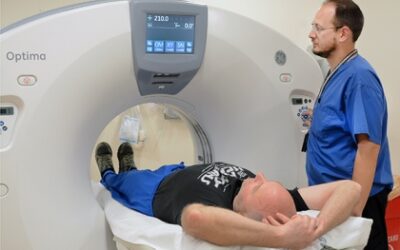A recent audit of VA’s Medical Surgical Prime Vendor Program (MSPV) found that lack of oversight of the system, which is meant to save VA money by better leveraging the department’s buying power, is costing VA hundreds of millions a year.
COVID-19 Complications Continue to Arise Three Years After Infection
The long-term effects of COVID-19 might last longer and manifest themselves later than was previously thought, according to a new study that followed patients for three years after their initial illness.
New Research Finds Service Dogs Beneficial for Veterans With PTSD
The VA covers the veterinary care and the equipment costs of service dogs for veterans with physical disabilities such as blindness or vision impairment, but the use of service dogs for veterans with post-traumatic stress disorder (PTSD) and other mental health issues has remained controversial.
Recurrent Hyperkalemia Found to Be Higher in Black, Hispanic Veterans
In U.S. veterans with incident hyperkalemia, the risk of recurrent hyperkalemia within one year is higher in Black and Hispanic patients, according to a recent study.
Supplements Marketed to Military Contain Dangerous, Illegal Substances
Dietary supplements for weight loss are widely promoted online and through social media, with many claiming to have the added benefits of building lean muscle and enhancing energy and performance.
Real-World VA Study Shows Substantial Mortality Benefit From Lung Cancer Screening
Veterans who underwent VHA lung cancer screening were more likely to be diagnosed at an earlier stage and had higher cure rates than those who were not screened, according to a new observational study.
Prospective Memory Deficits Explained in Multiple Sclerosis Patients
Patients with multiple sclerosis (MS) have been found to have prospective memory (PM) deficits. A new study sought to better understand how and why that occurs.
Exposure to Agent Orange Associated With Increased Prostate Cancer Risk
In veterans who were on active duty during the Vietnam War era, exposure to Agent Orange was associated with a small increase in the risk of developing prostate cancer, but not metastatic prostate cancer or fatal prostate cancer, according to a recent study.
Veterans With MS Face Disparities in VA Smoking-Cessation Treatment
Even though smoking is a risk factor for multiple sclerosis (MS) development, symptom burden, decreased medication efficacy and increased disease-related mortality, veterans with the disease continue to smoke at critically high rates, according to a new study.
Why Does Epstein-Barr Lead to Multiple Sclerosis in Some Patients?
Only a small proportion of patients infected with the Epstein-Barr virus (EBV) develop multiple sclerosis (MS). A new military study sought to determine why that is and what the underlying mechanisms are.
In a Turnaround, Nearly All VA Hospitals Require Personnel to Get Flu Shots
In 2017, almost no healthcare personnel at VA hospitals reported in a survey that they had received mandatory influenza vaccinations. By 2021, almost all VA respondents said they had.
Sacubitril/Valsartan Not Linked to Higher Dementia Rates in HF Patients
Could using the drug combination sacubitril/valsartan, an angiotensin receptor/neprilysin inhibitor, in heart failure patients increase their risk of cognitive impairment?
Influenza Associated With Coronary, Cerebrovascular Events in Older Veterans
Influenza is a significant contributor to coronary and cerebrovascular events in U.S. veterans and exacerbates underlying conditions, according to a new study.
Kidney Disease Defined by KDIGO Guidelines Riskier for Veterans With HF
Is chronic kidney disease (CKD) diagnosed based on a single estimated glomerular filtration rate measurement significantly different from that diagnosed using the Kidney Disease: Improving Global Outcomes (KDIGO) guideline?
Olfactory Function Loss in GW Veterans Linked to Cognitive Deficits
A disorder related to military service in the 1991 Gulf War (GW), Gulf War illness (GWI)/Chronic Multisymptom Illness (CMI), includes symptoms such as fatigue, pain and cognitive dysfunction.
Guideline Discordant Care Leads to Lower NSCLC Survival in AI/AN
American Indian/Alaska Native (AI/AN) patients have lower overall survival rates from non-small cell lung cancer (NSCLC), and at least part of the reason is that they are less likely to receive guideline-concordant care, according to a new study.
Mutant HRAS-Driven BC Tumors More Linked to Skeletal Muscle Dysfunction
The quality of life for many breast cancer patients is affected by skeletal muscle dysfunction, which is estimated to appear in about 39% of cases.
Red Flag Signs, Symptoms Could Mean Early-Onset Colorectal Cancer
Colorectal cancer is one of the most common cancers in the United States and worldwide, with about 4,000 cases diagnosed each year in the VA alone. While the rate of colorectal cancer among older individuals—who traditionally were at greatest risk—has decreased in recent years, the incidence in younger people has been increasing at an “alarming rate,” according to a recent study.
Using ‘Colon Age’ to Determine Cancer Screening for Veterans Younger Than 50
A new metric, so-called colon age, has been developed to help estimate the risk for early-onset colorectal cancer (EOCRC) in male veterans.
Skin Disorders Such as Atopic Dermatitis Can Have Extracutaneous Effects
Aging can lead to the development of cutaneous symptoms and disorders, and in many older adults the effects often are not limited to the skin, according to a new VA study.
Advocates Warn VA’s Spinal Cord Injury Hub System Is In Danger of Collapse
The Spinal Cord Injury and Disorders (SCID) system, the hub-and-spoke model of care that VA uses to treat some of its most vulnerable veterans, is in danger of collapse, veterans’ advocates are telling lawmakers. According to them, the system is under-financed and understaffed, with patients being turned away because of the lack of resources.
Psychiatric, Health Factors Should Be Considered in Veterans With Cognitive Decline
While cognitive decline in older people often raises suspicion of early Alzheimer’s disease, a new VA study underscores the importance of considering how factors beyond Alzheimer’s—including post-traumatic stress disorder (PTSD), pain and sleep difficulties—might also impact cognition in older veterans.
More Than 14 million U.S. Adults on Statins Might Not Really Need Them
Equations that estimate 10-year risk of atherosclerotic cardiovascular disease (ASCVD) appear to have overestimated the number of U.S. adults eligible for primary prevention statin therapy, according to a new study.
Smaller Brainstem Volumes Found in Gulf War, Iraq/Afghanistan Veterans
Gulf War and Iraq/Afghanistan veterans have significantly smaller brainstem volumes compared to healthy civilians, and damage to the brainstem structure of these veterans could potentially lead to sleep disturbances and chronic pain, according to a recent study.
Indeterminate Liver Nodules Have a High but Variable Risk of HCC
DALLAS – For more than a decade, the Liver Imaging Reporting and Data System (LI-RADS) has been used to standardize the interpretation and reporting of liver lesions in patients at high risk for hepatocellular carcinoma (HCC). Yet, predicting what happens with...
Agent Orange Exposure Not Linked to Hepatocellular Carcinoma
LOS ANGELES -- Hepatocellular carcinoma (HCC) and related mortality are on the rise. A recent study sought to determine if Agent Orange exposure is one of the factors affecting veterans. “Viral hepatitis and alcohol are leading risk factors; however, other risk...
Surveys: Better HCC Surveillance Seen as Key to Improved Survival Rates
PALO ALTO, CA -- Even though hepatocellular carcinoma (HCC) surveillance in associated with improved survival, screening of cirrhosis patients is suboptimal, especially in primary care settings, according to recent surveys. A recent study in JAMA Network Open argued...
Congressional Testimony Puts Focus on TBIs Caused by Weapons Training
While traumatic brain injury (TBI) and its impact on the lives of servicemembers and veterans have received considerable attention, most of that attention has focused on TBIs incurred during combat.
Traumatic Brain Injury Associated With Increased Risk of Brain Cancer
Traumatic brain injury (TBI) has been linked to poor long-term outcomes in the veteran population, including cardiovascular disease, dementia, epilepsy and mental health issues. A new study of post-9/11 veterans provides evidence of yet another concerning effect of TBI—an increased, although still low, risk of brain cancer.
Social Avoidance, Other Deficits Appear to Be Features of Schizophrenia, Bipolar Disorder, Not Just the Consequences of Social Isolation
While individuals with schizophrenia and bipolar disorder often have difficulty with relationships and being part of a community, a recent study involving U.S. veterans has found that social cognitive deficits and high social avoidance motivation appear to be actual features of the clinical conditions and not the result of living in social isolation.






